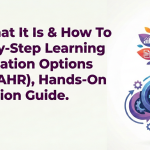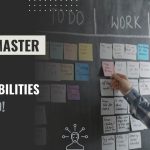Learn the 6 soft skills that can help you in becoming a better scrum master.
Becoming a successful scrum master requires not only mastering the scrum principles and methodologies but also important soft skills. Soft skills assist individuals make better interactions making sure the team is not only productive but also harmonious. Let’s look at six essential soft skills that will make you a better scrum master.
1. Empathy
Empathy enables a scrum master to understand and share the feelings and needs of other team members. Emotional intelligence also assists scrum masters in managing their emotions and understanding the emotions of others. Empathetic Scrum Masters can better understand the challenges other teammates face at work or even personally and effectively help them. Empathy among team members creates a supportive environment where members can feel valued and understood. This strengthens team cohesion and builds trust which are important for better interactions, collaboration and maximum productivity.
2. Communication
Communication is one of the most important skills that a scrum master should have. Effective communication ensures that the information being passed is understood without misunderstandings and if any, they are quickly corrected maximizing productivity. It also involves active listening where one should understand the information correctly not just the words but also the emotions and context being expressed. By understanding and addressing the concerns of your team you create an environment of trust and transparency. Scrum Masters should create an environment of open discussion where members can freely express themselves.
3. Problem Solving and Conflict Resolution
Just as in life, problems and conflicts will always be present, even in Scrum. As a scrum master, it is important to have problem-solving and conflict-resolution skills to manage and resolve them appropriately. Techniques such as mediation, conducting healthy debates and ensuring that everyone is heard and respected can be applied to solve conflicts before they break team cohesion and disrupt the team’s progress. A Scrum Master should create a culture of openness, respect and collaborative problem-solving to help the team navigate challenges in a manner that strengthens it and keeps it focused on its work.
4. Adaptability
Agile environments are constantly changing and as a scrum master, you should be flexible being able to adapt to these changes quickly and effectively. Adaptability allows you to pivot strategies quickly and efficiently in response to new information or shifts in the project scope. Scrum masters should embrace change and encourage it as it provides new opportunities for improvement and further innovation. Embracing change also helps in maintaining the team’s momentum ensuring it is continually improving towards its goals.
5. Coaching
A great Scrum Master is also a coach and mentor. As a team coach in adopting and improving agile practices, a Scrum Master coaches much more than teaching the Scrum framework. Being a Scrum Master, you’re guiding through the Scrum practices, making agile principles understandable and practicable, and encouraging learning opportunities. The excellent coaches are patient, excellent listeners, and know how to give constructive feedback.
6. Servant Leadership
A good Scrum Master understands his purpose and follows the servant leadership model. This involves putting the team’s or organization’s needs before their own. They solve issues that arise among the team, offer guidance to the team, provide the team with the tools they need to be successful and cultivate a culture of transparency and respect. Servant leaders empower team members, helping them to grow both professionally and personally, and building an environment with the best working conditions for the team.
Conclusion
To become a successful scrum master both the technical skills and soft skills. Acquiring these soft skills will greatly improve your day-to-day work when interacting with other team members and customers. Empathy helps understand team members’ feelings, effective communication improves clarity and cohesion, conflict resolution ensures harmony in the team, and coaching ensures continuous learning and adaptability embraces change. Using these skills, you will be able to improve your effectiveness and contribute to the team’s success and satisfaction.

Bhavna is an Agile Coach and Consultant with 15+ years of experience in advisory, corporate finance, IT assurance, and operations at Big 4 and within the industry in the UK and India. She has recently been the CEO of a start-up where she implemented agile practices within HR, Marketing, and Product teams.
She is also a SAFe® Practice Consultant (SPC) and authorized instructor for ICAgile Agility in HR (ICP-AHR), Agility in Marketing (ICP-MKG), and Business Agility Foundations (ICP – BAF) training courses. She provides training for agile transformation to corporate, public, and private batches, as well as consulting for enterprise agile transformation.







